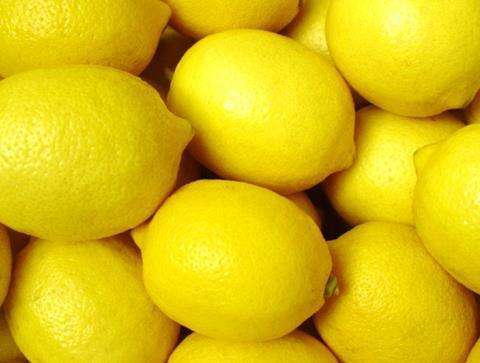
With the success story that has been the inexorable rise of easy peelers over the last decade, a remarkable revolution in the fortunes of another citrus fruit is going largely overlooked.
Lemons, long considered an unglamorous addition to the fresh produce aisle largely associated with people feeling ill and old-fashioned alcoholic drinks, are having a rebirth. Lemon sales have enjoyed a 16.9 per cent sales increase in the past year, equating to an additional £12 million in sales [Kantar Worldpanel, 52 w/e 28 February 2016]. The rise in popularity is such that growers are reportedly struggling to keep up with demand.
Lemons have become “fashionable” as Brits squeeze them into water to help them be healthier and lose weight, according to Paul Haynes, commercial director at MMG Citrus. He notes that a similar effect is being seen on limes.
Hazel Akehurst, business unit manager at Capespan UK, adds that the versatility of lemons, alongside the rise of flavoured waters, is making them a regular fixture in the weekly shopping basket, and they fit in well with modern concerns over food waste.
“Consumers tend to keep them in the fridge and don’t fear that they will go off,” she explains. “They are using them as an ingredient in dishes in winter and in salads and drinks in the summer.”
In South Africa, the success with lemons and the demand for late mandarins have resulted in a major expansion of orchards over the past two years. “They are not planting lemons and late mandarins, they are sowing them,” says one industry insider. Akehurst backs up that view, claiming that lemon growers are struggling to keep pace with demand in South Africa, while in Spain producers are attempting to grow for longer and with more fruit on the trees.
Lemons’ good fortune juxtaposes a continued decline in sales of whole oranges, which slumped by 5.5 per cent in the past year as consumers favour easy peelers. Long-term, soft citrus is expected to continue to grow its share while oranges’ gradual decline goes on. Rob Cullum, managing director at Pacific Produce says he is pleased to see more blood oranges on shelf and believes this could put some impetus back into the orange category, offering a point of difference from the norm.
In easy peelers, Nadorcott remains a star performer, but while Cullum acknowledges its benefits, he says he would like to see more variety in the fixture for the good of consumers as well as producers.
“In citrus there’s been a constant drive towards the likes of Nadorcott, with nice dark colour. My concern is that we become too homogenous. We are not giving people choice. Nobody can deny that Nadorcott is king and it is lovely, but so are other varieties. People are so fascinated by appearance that they ignore other varieties that are great and I don’t think that’s good for the consumer.”
Akehurst says soft citrus is “gradually taking over the citrus category” and doesn’t expect that to change. “If we talk long term, soft citrus is the future,” she adds. “There will always be a role for oranges for juicing and freshly squeezed though. And premium Naval varieties do have a future too.”
The older age profile of citrus consumers – the core purchasing group are the over 65s, who are responsible for 35 per cent of citrus consumption compared to 29 per cent for fruit overall – suggests that innovation and variety of offer would be welcome to enthuse youngergenerations.
At a production level, a number of issues around weather and currency exchange are making life challenging for traders. “For us the dollar is the biggest challenge, with the euro and sterling relatively weak,” says Cullum. “Citrus is a commodity that we are importing from dollar-based economies, and everyone is in the same position. The South African currency is extremely weak so the opposite is happening to them.”
Haynes says that the weather is proving particularly problematic in regions from where MMG is importing, with tightness of supply expected to be one of the outcomes. Spain has suffered “one of its worst seasons for a long time” with extremely high temperatures, while there have been droughts in key southern hemisphere production areas. These have led to smaller-sized easy peelers, as well as having the effect of bringing the seasons on earlier, he explains.
Cullum adds that Brazil in particular has had a bad time of it, suffering with drought, floods, dengue and devaluation of the real, the national currency.



